The breadth of BEST, from materials to cells to systems, is demonstrated by the excellent faculty members conducting energy storage research who make up the BEST Center.
Chris Rahn
 Christopher D. Rahn graduated from the University of Michigan with a B.S. in mechanical engineering in 1985 and an M.S. from the University of California, Berkeley in 1986. After three years as a Research and Development Engineer at Ford Aerospace, he returned to Berkeley to pursue a Ph.D. After graduating from Berkeley in 1992, Dr. Rahn joined the Department of Mechanical Engineering at Clemson University. In 2000, he moved to the Pennsylvania State University where he is now the J. ‘Lee’ Everett Professor of Mechanical Engineering, Director of the Mechatronics Research Laboratory, Co-Director of the Battery and Energy Storage Technology Center, and Associate Dean for Innovation in the College of Engineering. Dr. Rahn’s research work on the modeling, analysis, design, and control of mechatronic systems has resulted in three books (including Battery Systems Engineering), over two hundred peer-reviewed publications, and several patents. An ASME Fellow, Dr. Rahn served as an Associate Editor of two ASME journals and chaired an ASME technical committee and the ASME Design Engineering Division.
Christopher D. Rahn graduated from the University of Michigan with a B.S. in mechanical engineering in 1985 and an M.S. from the University of California, Berkeley in 1986. After three years as a Research and Development Engineer at Ford Aerospace, he returned to Berkeley to pursue a Ph.D. After graduating from Berkeley in 1992, Dr. Rahn joined the Department of Mechanical Engineering at Clemson University. In 2000, he moved to the Pennsylvania State University where he is now the J. ‘Lee’ Everett Professor of Mechanical Engineering, Director of the Mechatronics Research Laboratory, Co-Director of the Battery and Energy Storage Technology Center, and Associate Dean for Innovation in the College of Engineering. Dr. Rahn’s research work on the modeling, analysis, design, and control of mechatronic systems has resulted in three books (including Battery Systems Engineering), over two hundred peer-reviewed publications, and several patents. An ASME Fellow, Dr. Rahn served as an Associate Editor of two ASME journals and chaired an ASME technical committee and the ASME Design Engineering Division.
Chao-Yang Wang
 Dr. Chao-Yang Wang is Distinguished Professor of Mechanical and Chemical Engineering, Professor of Materials Science and Engineering, and William E. Diefenderfer Chair in Mechanical Engineering at the Pennsylvania State University. He has been the founding director of Electrochemical Engine Center (ECEC) since 1997. Dr. Wang received NSF CAREER award and premier research award from the Penn State Engineering Society, and has been a senior technical advisor to the United Nations Development Program (UNDP) and a delegate to Indo-U.S. and Canada-US fuel cell workshops. A fellow of ASME, Dr. Wang serves on the editorial board of several journals and book series. He holds over 50 patents (U.S., China, EU and Japan) and has published one book titled “Modeling and Diagnostics of Polymer Electrolyte Fuel Cells” by Springer, and nine book chapters and reviews as well as over 170 journal articles. He has 7,500 SCI citations and an H-index of 49. Dr. Wang’s research interests cover the transport, materials, manufacturing and modeling aspects of batteries and fuel cells.
Dr. Chao-Yang Wang is Distinguished Professor of Mechanical and Chemical Engineering, Professor of Materials Science and Engineering, and William E. Diefenderfer Chair in Mechanical Engineering at the Pennsylvania State University. He has been the founding director of Electrochemical Engine Center (ECEC) since 1997. Dr. Wang received NSF CAREER award and premier research award from the Penn State Engineering Society, and has been a senior technical advisor to the United Nations Development Program (UNDP) and a delegate to Indo-U.S. and Canada-US fuel cell workshops. A fellow of ASME, Dr. Wang serves on the editorial board of several journals and book series. He holds over 50 patents (U.S., China, EU and Japan) and has published one book titled “Modeling and Diagnostics of Polymer Electrolyte Fuel Cells” by Springer, and nine book chapters and reviews as well as over 170 journal articles. He has 7,500 SCI citations and an H-index of 49. Dr. Wang’s research interests cover the transport, materials, manufacturing and modeling aspects of batteries and fuel cells.
Satadru Dey
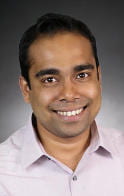 Satadru Dey is an assistant professor in the Department of Mechanical Engineering at The Pennsylvania State University where he directs Smart City Laboratory. Prior to that, he was an assistant professor of Electrical Engineering at the University of Colorado Denver from 2017 to August 2020. He received his Ph.D. in Automotive Engineering from Clemson University in 2015. He was a postdoctoral researcher at the University of California, Berkeley from 2015 through 2017. During the period of 2010-2012, he worked for General Electric Company as a control engineer. His technical background is in control systems. His research interests lie in energy and transportation infrastructure of smart cities. Specifically, his research group is developing algorithms to enable safe, efficient, and secure battery systems, connected and autonomous vehicles, and transportation networks. He is a senior member of the Institute of Electrical and Electronics Engineers (IEEE) and a member of the American Society of Mechanical Engineers (ASME). He is also involved with activities in IEEE Smart Cities Technical Committee of the IEEE Control Systems Society and ASME Energy Systems Technical Committee.
Satadru Dey is an assistant professor in the Department of Mechanical Engineering at The Pennsylvania State University where he directs Smart City Laboratory. Prior to that, he was an assistant professor of Electrical Engineering at the University of Colorado Denver from 2017 to August 2020. He received his Ph.D. in Automotive Engineering from Clemson University in 2015. He was a postdoctoral researcher at the University of California, Berkeley from 2015 through 2017. During the period of 2010-2012, he worked for General Electric Company as a control engineer. His technical background is in control systems. His research interests lie in energy and transportation infrastructure of smart cities. Specifically, his research group is developing algorithms to enable safe, efficient, and secure battery systems, connected and autonomous vehicles, and transportation networks. He is a senior member of the Institute of Electrical and Electronics Engineers (IEEE) and a member of the American Society of Mechanical Engineers (ASME). He is also involved with activities in IEEE Smart Cities Technical Committee of the IEEE Control Systems Society and ASME Energy Systems Technical Committee.
Michael J. Janik
 Dr. Janik is the Brennan Clean Energy Assistant Professor of Chemical Engineering at PSU, beginning his appointment August, 2006. His research interests are in the use of computational methods to understand and design materials for alternative energy conversion systems. Current activities focus on fuel cells and b, with additional efforts in hydrogen generation, desulfurization, and CO2 capture. Research methods emphasize atomistic simulation using quantum chemical methods and kinetic modeling. Janik is affiliated with the PSU Electrochemical Engine Center, Battery and Energy Storage Technology Center and the PSU Institutes of Energy and the Environment. Janik is the director of a National Science Foundation supported Research Experience for Undergraduates cite in “Chemical Energy Storage and Conversion.” The Janik research group currently includes 8 graduate students and 4 undergraduate students, and is supported by funding from the National Science Foundation, American Chemical Society Petroleum Research Fund, and the Department of Energy. Dr. Janik received his B. S. in Chemical Engineering from Yale University. Following three years as a Process Engineer for Procter and Gamble, Janik returned to graduate school at the University of Virginia. Janik completed his doctoral thesis examining acid catalysis by polyoxometalates and post-doctoral work studying methanol electrooxidation. He is the author of over 40 peer reviewed papers.
Dr. Janik is the Brennan Clean Energy Assistant Professor of Chemical Engineering at PSU, beginning his appointment August, 2006. His research interests are in the use of computational methods to understand and design materials for alternative energy conversion systems. Current activities focus on fuel cells and b, with additional efforts in hydrogen generation, desulfurization, and CO2 capture. Research methods emphasize atomistic simulation using quantum chemical methods and kinetic modeling. Janik is affiliated with the PSU Electrochemical Engine Center, Battery and Energy Storage Technology Center and the PSU Institutes of Energy and the Environment. Janik is the director of a National Science Foundation supported Research Experience for Undergraduates cite in “Chemical Energy Storage and Conversion.” The Janik research group currently includes 8 graduate students and 4 undergraduate students, and is supported by funding from the National Science Foundation, American Chemical Society Petroleum Research Fund, and the Department of Energy. Dr. Janik received his B. S. in Chemical Engineering from Yale University. Following three years as a Process Engineer for Procter and Gamble, Janik returned to graduate school at the University of Virginia. Janik completed his doctoral thesis examining acid catalysis by polyoxometalates and post-doctoral work studying methanol electrooxidation. He is the author of over 40 peer reviewed papers.
Mehdi Kiani
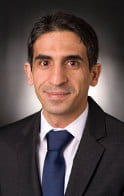 Mehdi Kiani received the B.S. degree from Shiraz University, Shiraz, Iran, and the M.S. degree from Sharif University of Technology, Tehran, Iran, in 2005 and 2008, respectively. He received his M.S. and Ph.D. degrees in Electrical and Computer Engineering from the Georgia Institute of Technology in 2012 and 2013, respectively. He is currently an assistant professor in the School of Electrical Engineering and Computer Science at the Pennsylvania State University. His research interest is analog/power-management integrated circuits, wireless systems design and integration, and wireless power/data transfer for biomedical application. He has published more than 60 peer-reviewed conference and journal papers in IEEE and several book chapters. He was the recipient of the Georgia Tech Sigma Xi Best PhD Thesis Award, and Georgia Tech Chih Foundation Research Award for excellent research in the fields of engineering and health sciences. He is an Associate Editor of the IEEE Transactions on Biomedical Circuits and Systems and has served on the subcommittees of the IEEE Sensors and IEEE Custom Integrated Circuits Conference.
Mehdi Kiani received the B.S. degree from Shiraz University, Shiraz, Iran, and the M.S. degree from Sharif University of Technology, Tehran, Iran, in 2005 and 2008, respectively. He received his M.S. and Ph.D. degrees in Electrical and Computer Engineering from the Georgia Institute of Technology in 2012 and 2013, respectively. He is currently an assistant professor in the School of Electrical Engineering and Computer Science at the Pennsylvania State University. His research interest is analog/power-management integrated circuits, wireless systems design and integration, and wireless power/data transfer for biomedical application. He has published more than 60 peer-reviewed conference and journal papers in IEEE and several book chapters. He was the recipient of the Georgia Tech Sigma Xi Best PhD Thesis Award, and Georgia Tech Chih Foundation Research Award for excellent research in the fields of engineering and health sciences. He is an Associate Editor of the IEEE Transactions on Biomedical Circuits and Systems and has served on the subcommittees of the IEEE Sensors and IEEE Custom Integrated Circuits Conference.
Serguei N. Lvov
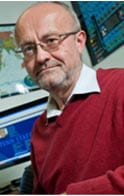 Serguei N. Lvov is Professor of Energy and Mineral Engineering & Materials Science and Engineering and Director of Electrochemical Technologies Program at the EMS Energy Institute of the Pennsylvania State University. Prior to his tenure at Penn State he worked at St. Petersburg School of Mines and the Russian Academy of Science. His main area of research is electrochemistry and thermodynamics of aqueous systems under extreme environments such as elevated temperatures and pressures or high concentrated solutions. He has carried out an innovative work to develop high temperature/high pressure flow-through electrochemical techniques including potentiometric, electrochemical kinetics, corrosion and electrophoresis studies. He has developed an internationally accepted formulation for the self-ionization of water covering a wide range temperatures and densities. He is author of more than 180 papers, 6 book chapters, and 3 books. His recent book Introduction to Electrochemical Science and Engineering was published by CRC Press in 2015.
Serguei N. Lvov is Professor of Energy and Mineral Engineering & Materials Science and Engineering and Director of Electrochemical Technologies Program at the EMS Energy Institute of the Pennsylvania State University. Prior to his tenure at Penn State he worked at St. Petersburg School of Mines and the Russian Academy of Science. His main area of research is electrochemistry and thermodynamics of aqueous systems under extreme environments such as elevated temperatures and pressures or high concentrated solutions. He has carried out an innovative work to develop high temperature/high pressure flow-through electrochemical techniques including potentiometric, electrochemical kinetics, corrosion and electrophoresis studies. He has developed an internationally accepted formulation for the self-ionization of water covering a wide range temperatures and densities. He is author of more than 180 papers, 6 book chapters, and 3 books. His recent book Introduction to Electrochemical Science and Engineering was published by CRC Press in 2015.
Herschel Pangborn
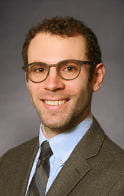 Dr. Herschel C. Pangborn is an Assistant Professor of Mechanical Engineering and the Principal Investigator of the Pangborn Advanced Controls Lab. His research focuses on the dynamic modeling, design, and control of vehicle and building electro-thermal energy systems. In the area of control, he seeks to enable new paradigms in performance, safety, efficiency, and sustainability by employing predictive hierarchical control frameworks that coordinate decision-making across multiple systems, timescales, and physical domains. He also specializes in the control of systems characterized by switched dynamic behavior and/or with actuators that have discrete modes of operation.
Dr. Herschel C. Pangborn is an Assistant Professor of Mechanical Engineering and the Principal Investigator of the Pangborn Advanced Controls Lab. His research focuses on the dynamic modeling, design, and control of vehicle and building electro-thermal energy systems. In the area of control, he seeks to enable new paradigms in performance, safety, efficiency, and sustainability by employing predictive hierarchical control frameworks that coordinate decision-making across multiple systems, timescales, and physical domains. He also specializes in the control of systems characterized by switched dynamic behavior and/or with actuators that have discrete modes of operation.
Before earning his doctorate in Mechanical Engineering from the University of Illinois at Urbana-Champaign in 2019, he received a B.S. in Mechanical Engineering from Penn State in 2013 and an M.S. in Mechanical Engineering from Illinois in 2015.
Feifei Shi
 Dr. Feifei Shi currently serves as Assistant Professor of Energy Engineering in the John and Willie Leone Family Department of Energy and Mineral Engineering. Dr Shi’s research interests lie broadly at the intersection of surface chemistry, material science and mechanical engineering, with emphasis on integrated energy systems, i.e. innovation in conversion, storage, transport and consumption systems. She holds a B.S. degree in Chemistry from Fudan University, China in 2010, and Ph.D. degree in Mechanical Engineering from the University of California, Berkeley in 2015. Before joining Penn State on August 2019, Dr. Shi was a postdoctoral researcher in Material Science and Engineering department, Stanford University from 2016-2019.
Dr. Feifei Shi currently serves as Assistant Professor of Energy Engineering in the John and Willie Leone Family Department of Energy and Mineral Engineering. Dr Shi’s research interests lie broadly at the intersection of surface chemistry, material science and mechanical engineering, with emphasis on integrated energy systems, i.e. innovation in conversion, storage, transport and consumption systems. She holds a B.S. degree in Chemistry from Fudan University, China in 2010, and Ph.D. degree in Mechanical Engineering from the University of California, Berkeley in 2015. Before joining Penn State on August 2019, Dr. Shi was a postdoctoral researcher in Material Science and Engineering department, Stanford University from 2016-2019.
Randy Vander Wal
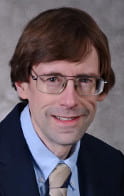 Randy Vander Wal is a Professor of Energy and Mineral Engineering, Materials Science and Engineering, and Mechanical Engineering. His research and teaching are centered within the fuels, energy and water nexus. Current research interests include CVD and flame synthesis of carbon nanomaterials, their application as conducting thin films, fundamentals of graphene bonding, carbon graphitization kinetics, carbon material characterization by high-resolution electron microscopy, HRTEM with image quantification for nanostructure, electron spectroscopic techniques, XPS, and EELs for bonding detail, and carbon materials’ oxidation reactivity dependence on nanostructure. The optical, electrical and thermal properties of graphene and other graphitic carbon forms produced by pulsed laser heating is presently under study, as is the fabrication of advanced carbon-carbon composites based on these. Related study includes biochar production.
Randy Vander Wal is a Professor of Energy and Mineral Engineering, Materials Science and Engineering, and Mechanical Engineering. His research and teaching are centered within the fuels, energy and water nexus. Current research interests include CVD and flame synthesis of carbon nanomaterials, their application as conducting thin films, fundamentals of graphene bonding, carbon graphitization kinetics, carbon material characterization by high-resolution electron microscopy, HRTEM with image quantification for nanostructure, electron spectroscopic techniques, XPS, and EELs for bonding detail, and carbon materials’ oxidation reactivity dependence on nanostructure. The optical, electrical and thermal properties of graphene and other graphitic carbon forms produced by pulsed laser heating is presently under study, as is the fabrication of advanced carbon-carbon composites based on these. Related study includes biochar production.
Adri van Duin
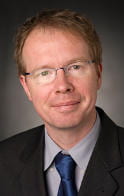 Dr Adri van Duin is a Professor in the Department of Mechanical and Nuclear Engineering. Research interests include the development and application of reactive force fields (ReaxFF). These developments encompass a wide range of materials, including hydrocarbons, all-carbon materials, nitramines, proteins, semiconductors and transition metals. Fields of application include catalysis, combustrion, ceramics, high-energy- and biomaterials. Substantial experience in multiscale (QM/FF/mesoscale) modeling of diagenesis and non-reactive flow of organic compounds in the subsurface and related geological, environmental, and archaeological applications.
Dr Adri van Duin is a Professor in the Department of Mechanical and Nuclear Engineering. Research interests include the development and application of reactive force fields (ReaxFF). These developments encompass a wide range of materials, including hydrocarbons, all-carbon materials, nitramines, proteins, semiconductors and transition metals. Fields of application include catalysis, combustrion, ceramics, high-energy- and biomaterials. Substantial experience in multiscale (QM/FF/mesoscale) modeling of diagenesis and non-reactive flow of organic compounds in the subsurface and related geological, environmental, and archaeological applications.
Donghai Wang
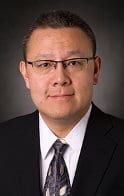 Dr. Donghai Wang obtained the Ph.D. degree from Tulane University in 2006. Before joining PSU, he was a post doctorate and then a staff scientist in Pacific Northwest National Laboratory. In 2009, Dr. Wang joined the Department of Mechanical and Nuclear Engineering as an Assistant Professor. Dr. Wang has been working on nanomaterial development for battery, fuel cells and solar cells. He has published over 30 technical papers in leading journals, co-authored and edited two books, presented over 20 talks at international conferences. Several of his research results have been selected as cover in high-profile journals.
Dr. Donghai Wang obtained the Ph.D. degree from Tulane University in 2006. Before joining PSU, he was a post doctorate and then a staff scientist in Pacific Northwest National Laboratory. In 2009, Dr. Wang joined the Department of Mechanical and Nuclear Engineering as an Assistant Professor. Dr. Wang has been working on nanomaterial development for battery, fuel cells and solar cells. He has published over 30 technical papers in leading journals, co-authored and edited two books, presented over 20 talks at international conferences. Several of his research results have been selected as cover in high-profile journals.
Jinchao Xu
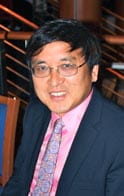 Jinchao Xu is the Francis R. and Helen M. Pentz Professor of Science and Director of the Center for Computational Mathematics and Applications at Penn State and also Changjiang Professor in Peking University. Professor Xu earned his bachelor’s degree at Xiangtan University in 1982, master’s degree at Peking University in 1984, and doctoral degree at Cornell University in 1989. He joined the Pennsylvania State University in 1989 as an assistant professor of mathematics, and then was promoted to associate professor in 1991 and professor in 1995. He was named Distinguished Professor of Mathematics in 2007. He was a plenary speaker at the International Congress for Industrial and Applied Mathematics in 2007 and also a 45-minute invited speaker at the International Congress for Mathematicians in 2010.
Jinchao Xu is the Francis R. and Helen M. Pentz Professor of Science and Director of the Center for Computational Mathematics and Applications at Penn State and also Changjiang Professor in Peking University. Professor Xu earned his bachelor’s degree at Xiangtan University in 1982, master’s degree at Peking University in 1984, and doctoral degree at Cornell University in 1989. He joined the Pennsylvania State University in 1989 as an assistant professor of mathematics, and then was promoted to associate professor in 1991 and professor in 1995. He was named Distinguished Professor of Mathematics in 2007. He was a plenary speaker at the International Congress for Industrial and Applied Mathematics in 2007 and also a 45-minute invited speaker at the International Congress for Mathematicians in 2010.
Professor Xu’s research specialty is numerical methods for partial differential equations that arise from modeling scientific and engineering problems. One major research interest is in multigrid methods for their theoretical analysis, algorithmic developments and practical application, especially developing, designing and analyzing fast methods for solving large-scale systems of equations. His work ranges from studying fundamental theoretical questions in numerical analysis to developing and applying numerical algorithms for practical applications. He is, perhaps, best known for the Bramble-Pasciak-Xu preconditioner — an algorithm that is one of the two most fundamental multigrid approaches for solving large-scale discretized partial-differential equations. He is also noted for the Hiptmair-Xu preconditioner which was featured in 2008 by the US Department of Energy as one of the 10 breakthroughs in computational science in recent years. One of Professor Xu’s more recent research focuses is on developing general as well as special purpose solvers and to develop actual software that can be directly applied to various practical problems, including lithium ion and fuel cell batteries, MHD fission energy, and porous media flows.
Sulin Zhang
 Dr. Sulin Zhang received his PhD in Engineering Mechanics from the University of Illinois, Urbana-Champaign. He then worked as a postdoctoral fellow in Northwestern University. He is currently a Professor in Department of Engineering Science and Mechanics and Department of Biomedical Engineering at Penn State University. Dr. Zhang’s research has been focused on the roles of mechanical forces and stresses in materials, biology, chemistry, and medicine. He is the recipient of the Early Career Development Award from National Science Foundation in 2007, the PSEAS Outstanding Research Award in 2016 from Penn State. Dr. Zhang is severing as an Associated Editor for the Journal “Extreme Mechanics Letters”, and an editorial board member for Nature Partner Journal “Computational Materials”.
Dr. Sulin Zhang received his PhD in Engineering Mechanics from the University of Illinois, Urbana-Champaign. He then worked as a postdoctoral fellow in Northwestern University. He is currently a Professor in Department of Engineering Science and Mechanics and Department of Biomedical Engineering at Penn State University. Dr. Zhang’s research has been focused on the roles of mechanical forces and stresses in materials, biology, chemistry, and medicine. He is the recipient of the Early Career Development Award from National Science Foundation in 2007, the PSEAS Outstanding Research Award in 2016 from Penn State. Dr. Zhang is severing as an Associated Editor for the Journal “Extreme Mechanics Letters”, and an editorial board member for Nature Partner Journal “Computational Materials”.
